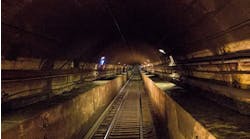A $1.2 million grant from the U.S. Environmental Protection Agency will help SEPTA improve air quality in and around its rail yards, through the conversion of a locomotive to a clean diesel engine.
EPA Regional Administrator Shawn M. Garvin announced the funding, made possible through EPA s Diesel Emissions Reduction Act Program, during a press conference today with SEPTA General Manager Joseph M. Casey. The EPA-funded project will help SEPTA repower the engine of a conventional diesel maintenance locomotive with two generator sets ( GenSet ), and a diesel particulate filter. The repower will drastically cut harmful diesel emissions.
"I commend SEPTA for its leadership on improving the environment and people's health," said Garvin.
"This GenSet engine project is enabling SEPTA to help clean our air while also generating fuel savings for the Authority. It underscores what EPA has been saying all along that environmental improvements create economic benefits as well. With funding secured, SEPTA can move forward on the project to install this state-of-the-art technology on a 1950s-era locomotive. The repower is expected to be complete by mid-2012. The locomotive is one of six in SEPTA's fleet used for maintenance, repairs and to rescue stranded trains. This initiative marks another important step forward in SEPTA's overall Sustainability Program," Casey said.
Through projects like this, SEPTA is becoming a better neighbor to the communities it serves and contributing to improved air quality. GenSet locomotives reduce nitrous oxide and particulate matter emissions by approximately 80 percent and can reduce carbon dioxide emissions by 25 percent through technologies that monitor engine idling and switch to sleep mode after a period of inactivity.
SEPTA continues to make environmental upgrades to many of its operations. Last year, SEPTA improved energy efficiency at its 1234 Market Street headquarters in Philadelphia and earned EPA's prestigious Energy Star Building label. The Energy Star labels are awarded only to buildings that reach 85 percent or greater energy efficiency.
SEPTA is also continuing efforts to replace traditional diesel buses with energy efficient diesel-electric hybrid buses. Over the last several years, SEPTA has added 472 hybrids to its fleet meaning approximately one-third of all buses in service are cleaner-burning hybrids.

